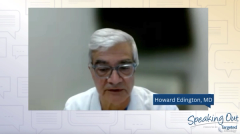
Personalized Cancer Treatment and Management With Oncolytic Viruses
As part of its Speaking Out video series, Howard D. Edington, MD, explores how oncolytic viruses are revolutionizing personalized cancer therapy, the challenges of interpreting vast genetic data, and the exciting potential of these targeted therapies.
Episodes in this series

Cancer treatments are constantly evolving, especially with new and innovative approaches like personalized medicine. One exciting area of research focuses on oncolytic viruses, which are modified viruses that target and infect cancer cells.
According to Howard D. Edington, MD, the key to this personalized approach lies in identifying actionable biomarkers, which are defined as unique changes within a tumor. These can include things such as specific mutations or antigens on the surface of cancer cells.
Similar to how trastuzumab (Herceptin) targets overexpressed proteins in some breast cancers, experts are hopeful that they can develop personalized oncolytic virus therapies that exploit these unique markers, allowing for highly targeted treatments that can maximize effectiveness for specific patient populations.
However, the challenge lies in interpreting the large amount of genetic data that is available. While Edington explains that there is now the ability to identify a number of mutations, understanding which ones are truly relevant for treatment is key and not yet fully understood. Researchers are working to develop methods to pinpoint the mutations that can guide therapy selection.
“I think there is a big quest for actionable biomarkers and mutations. Our ability to identify mutations has exceeded our ability to know what to do with them, so that is a definable challenge, if you will, to sift through the mutations that we can identify,” explained Edington.
Beyond treatment, Edington notes that there is a growing interest in preventative measures.
“There's a lot of interest in developing preventative measures for the patients that are at a high risk of developing one cancer or another. So, I think that is going to be a very fruitful area of research going forward,” added Edington.
This, Edington explained, could allow for early intervention with oncolytic viruses or other therapies and potentially prevent the disease altogether.
Moreover, while the goal of many cancer treatments is to ultimately lead to a cure, researchers are also focusing on therapies that can manage a patient’s cancer and improve one's quality of life. By controlling cancer growth and preventing progression, oncolytic viruses could turn cancer into a chronic, manageable condition.
“The cancer may be looked at as we look at hypertension or diabetes, not to minimize the impact of those things, but simply to underscore the notion that for many, cancer is something that we may not be able to get rid of, but we can certainly design therapies that allow us to live with it and live productively and without discomfort,” concluded Edington.










































